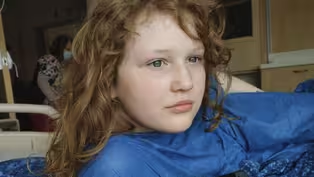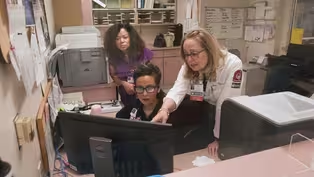
Weekly Insight
Clip: Season 5 Episode 25 | 3m 59sVideo has Closed Captions
Rhode Island’s largest hospital group, Lifespan, will be renamed Brown University Health.
Lifespan Health System and Brown University plan to expand their longstanding relationship with new financial investments. WPRI 12’s Politics Editor Ted Nesi and Rhode Island PBS Weekly’s Michelle San Miguel explain what the agreement entails. They also discuss what the expansion of accessory dwelling units means for those looking for housing in Rhode Island.
Problems playing video? | Closed Captioning Feedback
Problems playing video? | Closed Captioning Feedback
Rhode Island PBS Weekly is a local public television program presented by Ocean State Media

Weekly Insight
Clip: Season 5 Episode 25 | 3m 59sVideo has Closed Captions
Lifespan Health System and Brown University plan to expand their longstanding relationship with new financial investments. WPRI 12’s Politics Editor Ted Nesi and Rhode Island PBS Weekly’s Michelle San Miguel explain what the agreement entails. They also discuss what the expansion of accessory dwelling units means for those looking for housing in Rhode Island.
Problems playing video? | Closed Captioning Feedback
How to Watch Rhode Island PBS Weekly
Rhode Island PBS Weekly is available to stream on pbs.org and the free PBS App, available on iPhone, Apple TV, Android TV, Android smartphones, Amazon Fire TV, Amazon Fire Tablet, Roku, Samsung Smart TV, and Vizio.
Providing Support for PBS.org
Learn Moreabout PBS online sponsorship- Ted, welcome back, it's good to see you.
So we have big news to share in the world of healthcare.
The largest hospital group here in Rhode Island, Lifespan, announced it plans to form a deeper relationship with Brown University.
Lots of layers to this, but I think the first thing people will notice is this comes with a name change.
- Yes so Lifespan, just to remind everyone, is the parent of Rhode Island, Miriam, Newport, and Bradley hospitals, and they will be getting a new name, Brown University Health, and that's gonna start to roll out this fall or winter.
- To be clear, this does not mean there's a merger happening, Brown is not taking over Lifespan - [Todd] Correct.
none of the sort, but really this is adding to what's been a longstanding relationship between the two organizations.
- Right so Rhode Island Hospital has been the prime teaching hospital for Brown's medical school since the medical school was founded in the 1970s.
But this really flows out, Michelle, of the turmoil around the future of the hospital sector in Rhode Island that we've seen for the last decade, decade plus.
We've seen multiple failed merger attempts of the Lifespan-Care New England merger, the Brigham Takeover of Care New England that didn't go through.
And I think Brown, over time, came to the realization that they really had to be central to any solution to all of this.
And so what you see here is, along with Brown lending its name to Lifespan going forward and the hospitals, they're gonna put a lot of money into Lifespan, $150 million over the next seven years, which is a shot in the arm for Lifespan,, which has been unable to invest as much as they needed to in, you know, in technology and facilities and all of that.
So I think you see here, Brown sort of acknowledging that they need to use their deep pockets to try to stabilize what's a very important partner to them.
- I think most people want to know ultimately, what does this mean for the quality of care?
For those who maybe are not satisfied with the care they're receiving there, can they expect an improvement?
And for those who are, will the status quo remain?
- Well, I put that question to the CEO of Lifespan, John Fernandez, after the press conference.
He said he thinks for the average patient, this is really just a name change, they're gonna see a different name on the door, a different name on the letters they get from their doctor.
He does hope, he says, that over time patients will notice improvements, again, from the investments from the money Brown is providing and perhaps, from the ability to kind of recruit more clinicians, more top-notch doctors and all of the effects of that.
But we'll have to see if it pays off as much as they're hoping today.
- Right, we'll keep tracking that.
Let's also discuss the end of the General Assembly session.
Of course, hundreds of bills passed.
One of the top ones that we've been discussing was a priority for House Speaker Joe Shekarchi, expanding accessory dwelling units, also known as ADUs.
And for many people they have viewed this as really the way to solve the housing crisis in Rhode Island.
But it passed, but not before it was met with very strong resistance in the state Senate.
- Yes and people might remember that last year this bill failed, even though the house speaker, the most powerful lawmaker on Smith Hill wanted it.
He didn't get it last year, he got it through this year.
But it was a narrow vote in the Senate, Michelle which, as you say, I think speaks to the concern.
And frankly, the opponents seemed to have the same concerns that the supporters hope is a positive, which is this could lead to a lot of additional housing units.
People turning maybe a garage, above your garage, you know, becoming a spare bedroom with a kitchenette and a little bathroom.
Or maybe an old shed or an unused bit of your backyard could become something.
Shekarchi and people who think like him say that's a positive, that's what Rhode Island needs as one part of the solution to the housing crisis, you know, lots of infill housing.
But opponents worry about will it change the character of a neighborhood, will lead to too many rentals in places they wouldn't usually be and all of that.
We have seen California adopt this in recent years.
Another place with the big housing crisis.
And they have seen a lot of units added.
So we're now gonna have to see how the average Rhode Islander, you know, takes this law and what do they build with it.
- Sure and I think too, maybe people who were considering moving out of Rhode Island, feeling like they were being priced out may decide to stay.
- Well and that's part of what they're really hoping for here, Michelle, is it's one more piece that will allow for some more churn in the housing market.
Let people, a family that's growing that needs a bigger house, make it easier for them to find a place.
Maybe someone who wants to downsize can find a smaller place to live.
Young people needing just a one bedroom apartment that they can afford, maybe more of that.
So, you know, we will see if it works.
- Thanks so much Ted, appreciate it.
- Good to be here.
Video has Closed Captions
Clip: S5 Ep25 | 11m 23s | Steph Machado reports on the warehousing of children in a local psychiatric hospital. (11m 23s)
Video has Closed Captions
Clip: S5 Ep25 | 10m 17s | Why menopause symptoms go untreated. (10m 17s)
Providing Support for PBS.org
Learn Moreabout PBS online sponsorship
- News and Public Affairs

Top journalists deliver compelling original analysis of the hour's headlines.

- News and Public Affairs

FRONTLINE is investigative journalism that questions, explains and changes our world.












Support for PBS provided by:
Rhode Island PBS Weekly is a local public television program presented by Ocean State Media

